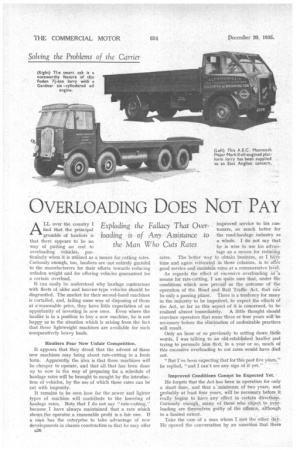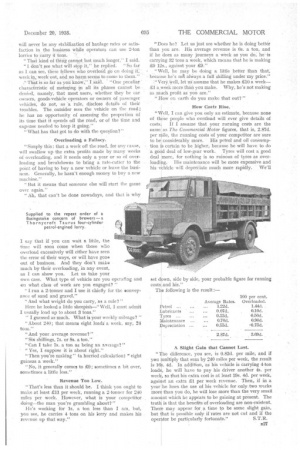OVERLOADING DOES NOT PAY
Page 36

Page 37

If you've noticed an error in this article please click here to report it so we can fix it.
LL over the country I
find that the principal grumble of hauliers is that there appears to be no way of putting an end to overloading vehicles, par ticularly when it is utilized as a means for cutting rates. Curiously enough, too, hauliers are not entirely grateful to the manufacturers for their efforts towards reducing unladen weight and for offering vehicles guaranteed for a certain overload.
It Can easily be understood why haulage contractors with fleets of older and heavier-type vehicles should be disgruntled. The market for their second-hand machines is curtailed, and, failing some way of disposing of them at a reasonable price, they have little expectation of an opportunity of investing in new ones. Even where the haulier is in a position to buy a new machine, he is not happy -as to the situation which is arising from the fact that ,these lightweight machines are available for such comparatively heavy loads.
Hauliers Fear New Unfair Competition.
It appears that they dread that the advent of these new machines may bring about rate-cutting in a fresh form. Apparently, the idea is that these machines will be cheaper to operate, and that all that has been done up to now, in the way of preparing for a schedule of haulage rates will be brought to naught by the introduction of vehicles, by the use of which these rates can be cut with impunity.
• It remains to be seen how. far the newer and lighter
• types of machine will contribute to the lowering of lhaiilage rates: Note, that I do not say "rate-cuffing,". because, I have always maintained that a rate which shows: he operator a reasonable profit is a fair one. If a man has the enterprise to take advantage of new developments in chassis construction so that he may offer
n26
improved service to his ellstomers, so much better for the road-haulage industry as a whole. I do not say that he is wise to use his advantage as a means for reducing rates. The better way to obtain business,, as I lid.:.■;fe time and again reiterated in these columns, is tO'011jr good service and Maintain rates at a remunerative leVel.
As regards the effect of excessive overloading means for rate cutting, I am quite sure that, under the conditions which now prevail as the outcome of the operation of the Road and Rail Traffic Act, thit be only a passing phase. There is a tendency for many in the industry to be impatient, to expect the effects of the Act, so far as this aspect of it is concerned, -to be realized almost immediately. A little thought should convince operators that some three or four years will be necessary before the elimination of undesirable practices will result.
Only an hour or so previously to setting down, thee words. I was talking to an old-established haulier and trying to persuade him that, in a year or so, much of this excessive overloading to cut rates would have died out.
But I've been expecting that for this past five years," he replied, "and I can't see any sign of it yet."
Improved Conditions Carmot be Expected Yet.
He forgets that the Act has been in operation for only a short time, and that a-minimum of two years, and probably at least four years, will be necessary before. it really begins to have any effect in certain directiORS. Curiously enotigh many of those Who object topypir-loading are themselves guilty of the offence although to a limited extent.
Take the case Of a man whom I Met the other. 4afk. He opened the conversation by an assertion that there will never be any stabilization of haulage rates or satisfaction in the business while operators can use 2-ton lorries to 'carry 4 tons. '
That kind of ti4ilig cannot last much longer," I said. " I don't see what will stop it he replied. " So far as I can see, these fellows who overloid g-o on doing it week in, week out, and no harm seems to come to them." That is so far as yon know I said One peculiar characteristic of motoring in all its phases cannot lac denied; namely, that most users, whether they be car owners, goods-vehicle .operators or owners of passenger vehicles; do not, as -a rule, disclose details of their troubles. The outsider sees the vehicle on the road; he has no opportunity: of assessing the proportion of its time that it spends off the road; or of the time and expense needed to keep it going."
"What has that got to do with the question? "
Overloading a Fallacy.
"Simply this: that a week off the road, for any cause, will swallow up the extra profits made by many weeks of overloading, and it needs only a year or so of overloading and breakdowns to bring a rate-cutter to the point of having to buy a new vehicle or leave the business. Generally, he hasn't enough money to buy a new machine."
" But it means that someone else will start the game over again."
" .Ah, that can't be done nowadays, and that is why I say that if you can wait a little, the time will soon Come when those who overload excessively will either have seen the error of their ways, or will have gona out of business. And they don't make much by their overloading, in any event, as I can show you. Let us take your own case. What type of vehicle are you operaring and on what class of work are you engaged?"
"I run a 2-tonner and I use it chiefly for the sonveyance of sand and gravel."
'And what weight do you carry, as a rule?"
Here he looked a little sheepish—" Well, I must admit I usually load up to about 3 tons."
" I guessed as much. What is your weekly mileage? "
About 240; that means eight loadsa week, say, 24 tons."
"And your. average revenue?" "Six shillings, 7s. or 8s. a ton."
" Can I take 73. a ton as being an average?"
• " Yes, I suppose it is about right."
"Then you're making" (a hurried calculation) "eight guineas a week."
"No, it generally comes to £9; sometimes a bit over, sometimes a little less."
Revenue Too Low.
"That's less than it should be. I think you ought to make at least £11 per week, running a 2-tonner for 240 miles per. week. , However, what is your competitor
doing—the man you're grumbling about?"
He's working for 1s. a ton. less than I am, but, you see, he carries 4. tons on his lorry and makes his revenue up that way."
"Does he? Let us just see whether he is doing better than you are. His average revenue is 6s. a ton, and if he does as many journeys a week as you do, he-is carrying 32 tons a week, which means that he is making £9 12s., against your £9."
"Well, he may be doing a little better than that, because he's not alirays a full shilling under my price." ." VerY 'Well, let uS assume that he makes £10 a weekayeek more than you make. Why, he's not making as much profit as you are."
"How on earth do you make that out?"
Row Costs Rise.
"Well, I can give you only an estimate, because none of these people who overload will ever give details of costs. If I assume that your running costs are the same as The Commercial Motor figures, that is, 2.87d. per irrile, the running costs of your competitor are sure to be considerably more. His petrol and oil consuraption is certain to be higher, because he will have to do a good deal of low-gear work. Tyres will cost a good
• deal more, for nothing is so ruinous of tyres as overloading. His maintenance will be more expensive and his vehicle will depredate much more rapidly. We'll set down, side by side, your probable figure for running costs and his."
The following is the result:—
A Slight Gain that Cannot Last.
"The difference, you see, is 0.82d. per mile; and if you multiply that sum by 240 miles per week, the result is 16s. 4d. In addition, as his vehicle is carrying 4-ton loads, he will have to pay his driver another 4s. 'per week, so that his extra cost is at least 19s. 4d. per week, against an extra -..g1 per week revenue. Then,. if in a year he loses the use of his vehicle for only two weeks more than you do, he will lose more than the very small amonnt which he appears to be gaining at present. The truth is that the benefits of overloading are non-existent. There may appear for a time to be some slight gum, but that is possible only if rates are not cut and if the
operator be particularly fortunate." S.T.R.




















































































